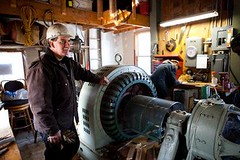The annual Bioneers conference is often a revelation to attendees, offering fresh, pragmatic, sustainable solutions to the social, cultural, and environmental problems of our age. The last conference included a keynote address from Amory Lovins, the cofounder, chief scientist, and chairman emeritus of the Rocky Mountain Institute. It's worth viewing—the talk summarizes many of the key ideas of Reinventing Fire, Bold Business Solutions for the New Energy Era.
Watch for a YouTube posting of Lovins' talk at TED2014: The Next Chapter, to be held in Vancouver, BC, Canada this next week.
A roving compendium of ecocentric energy options, including advances in solar and wind power, hybrid vehicles, and other thoughtful, balanced approaches to renewable energy.
Showing posts with label peak oil. Show all posts
Showing posts with label peak oil. Show all posts
Sunday, March 16, 2014
Thursday, April 05, 2012
Go fast without gas
Humans have a lot of different ways to get from Point A to Point B on this planet, but only the velomobile lets you travel with the grace and whimsy of a cartoon character.
As profiled in Grist, the velomobile consists of a reclining bicycle protected by a fiberglass shell that can optionally be assisted by an electric motor. They're fast, fuel free, and worth consideration if you're tired of being a victim of the fossilized proponents of the fossil fuel industry.
Get out there and pedal!
Labels:
efficiency,
environment,
peak oil,
transportation,
Velomobile
Sunday, February 12, 2012
Protecting Life on the Blue Marble

Sometimes we need a little perspective to get our priorities straight. As Bill McKibben points out in "The Great Carbon Bubble: Why the Fossil Fuel Industry Fights So Hard," we experienced the greatest weather extremes in recorded history in 2011, 14 weather disasters in the U.S. alone. And yet we have an entire political party in denial that there are any large-scale dynamics at work in the global weather system that potentially threaten our survival.
Why is the fossil fuel working so hard to spread denial about climate change? As in many things in life, follow the money.
Part of it’s simple enough: the giant energy companies are making so much money right now that they can’t stop gorging themselves. ExxonMobil, year after year, pulls in more money than any company in history. Chevron’s not far behind. Everyone in the business is swimming in money.
Still, they could theoretically invest all that cash in new clean technology or research and development for the same. As it happens, though, they’ve got a deeper problem, one that’s become clear only in the last few years. Put briefly: their value is largely based on fossil-fuel reserves that won’t be burned if we ever take global warming seriously.
The billions of dollars in profits earned by Chevron and ExxonMobil will build a lot of mansions for their highly paid executives. But, what's the point of a mansion if you don't have a habitable planet to build it on?
Saturday, December 11, 2010
A city powered by waste

Kristianstad, Sweden is setting an example for the rest of the world, as highlighted in this NY Times article, Using Waste, Swedish City Cuts Its Fossil Fuel Use. After a ten-year effort, the city of 80,000 has cut off the use of oil, natural gas, and coal for heating and now relies on waste products from farming and food processing to generate biogas.
hulking 10-year-old plant on the outskirts of Kristianstad uses a biological process to transform the detritus into biogas, a form of methane. That gas is burned to create heat and electricity, or is refined as a fuel for cars.
Once the city fathers got into the habit of harnessing power locally, they saw fuel everywhere: Kristianstad also burns gas emanating from an old landfill and sewage ponds, as well as wood waste from flooring factories and tree prunings.
Though the lock on fossil fuel use in the U.S. appears to be unbreakable, sometimes workable solutions to our energy problems are right in front of our noses.
Labels:
biofuels,
biogas,
efficiency,
energy,
environment,
peak oil,
renewable energy,
sustainability
Tuesday, June 15, 2010
RMI's Reinventing Fire initiative launched
If the catastrophe in the Gulf of Mexico makes you want to help move the U.S. to a more sane approach to meeting energy requirements, consider the path that the Rocky Mountain Institute has devised to reshape our thinking and our national priorities on energy issues.
Labels:
alternative energy,
climate destabilization,
CO2,
energy,
environment,
oil,
peak oil,
power,
renewable energy,
RMI,
solar,
sustainability
Thursday, May 27, 2010
Reacting to the Gulf of Mexico Disaster

Even the early NASA photos etched a chilling picture of the scope of the British Petroleum oil spill. The scale of environmental damage is incalculable and even though the outpouring of oil and gas appears to have been at least temporarily stopped, the true cost of this mega-accident won't be known for decades.
The sane response, and the one presented by Senator Bernie Sanders of Vermont, is to immediately launch a nationwide initiative to switch to clean energy. An excerpt from his press release on the subject lays out the simple facts:
The simple truth is that we cannot drill our way to energy independence or lower gas prices. The United States uses roughly 25 percent of the world’s oil, 7.5 billion barrels per year, but we have only 2 to 3 percent of the world’s proven oil reserves. Offshore drilling today provides roughly 10 percent of the oil we use in the United States. While we are all familiar with such political rhetoric, supported by the enormously profitable oil industry, as “drill here, drill now, pay less,” it’s just not accurate. The non-partisan Energy Information Administration has stated that opening new areas for offshore drilling would not save consumers a single penny per gallon until 2020, and would only save about 3 cents per gallon in 2030.
The alternative to continuing to risk catastrophe from offshore drilling is a bold and aggressive move to energy efficiency and sustainable energy. Instead of saving a few pennies on the gallon by 2030 through more drilling, we can save far more with stronger fuel economy standards. Just by raising our fuel efficiency standards to 35.5 miles per gallon for cars and trucks, as President Obama is doing, we will save consumers a dollar per gallon of gas in 2030, and save so much oil that we will no longer need to import any from Saudi Arabia. We know we can do this because new cars sold in China today average more than 36 miles per gallon, and General Motors already sells nearly as many cars in China as in the United States.
If, as a nation, we are prepared to take bold action in energy efficiency, public transportation, advanced vehicle technologies, solar, wind, biomass, and geothermal, we can transform our energy system, clean up our environment, and create millions of new jobs in the process. This direction, and not more offshore drilling, is where we have got to go.
No more new offshore drilling. Not now! Not ever!
Monday, April 19, 2010
Post Peak Oil Two-Wheeled Fun

I'm a sucker for two-wheeled vehicles, but I've been discouraged lately from the acquisition of petroleum-powered machines by both the nature of the fuel and the CO2 generation. Bicycles are great, but in a rural area with few bike paths battling autos for a tiny sliver of space on a skinny backroad can get dicey.
The introduction of a new electric scooter, the ZEV7000, as profiled by Gizmag, looks like a healthy way to enjoy two-wheeled travel without the pollution problem.
The battery power specs for this machine, billed as the fastest electric scooter on the market, look pretty good:
Range for the ZEV7000 is similar to the Vectrix at between 55 and 70 miles between charges, which take 25 minutes for a 75 percent top-up, or around 2 hours for a full charge. You can extend the vehicle's range or choose to access higher power by using what the company calls its "electronic transmission" - a switch that lets you choose how many amps the engine is running at. Low amps means low power but extended range, higher amps will drain the battery faster but give the bike substantially more beans.
Put up a wind turbine to recharge it at night and you've got a non-petroleum mode of transport that promises to be a kick and a half to ride.
Saturday, January 02, 2010
Stopping Major Climate Distruption

In his new book, Storms of My Grandchildren, climate scientist James Hansen offers a pragmatic solution, perhaps our last chance, for reversing the build-up of CO2 in the atmosphere and restoring equilibrium to global weather patterns. In an excerpt published in The Nation, Hansen spells out the essential tenets of his plan:
Let's define what a workable backbone and framework should look like. The essential backbone is a rising price on carbon applied at the source (the mine, wellhead, or port of entry), such that it would affect all activities that use fossil fuels, directly or indirectly.
Our goal is a global phaseout of fossil fuel carbon dioxide emissions. We have shown, quantitatively, that the only practical way to achieve an acceptable carbon dioxide level is to disallow the use of coal and unconventional fossil fuels (such as tar sands and oil shale) unless the resulting carbon is captured and stored. We realize that remaining, readily available pools of oil and gas will be used during the transition to a post-fossil-fuel world. But a rising carbon price surely will make it economically senseless to go after every last drop of oil and gas--even though use of those fuels with carbon capture and storage may be technically feasible and permissible.
Global phaseout of fossil fuel carbon dioxide emissions is a stringent requirement. Proposed government policies, consisting of an improved Kyoto Protocol approach with more ambitious targets, do not have a prayer of achieving that result. Our governments are deceiving us, and perhaps conveniently deceiving themselves, when they say that it is possible to reduce emissions 80 percent by 2050 with such an approach.
Hansen then goes into a discussion about why cap-and-trade solutions are doomed to failure and what our best bets are for preserving the planet for our grandchildren. As arguably the foremost authority on the issue of global warming, Hansen's words carry a strong degree of credibility.
Tuesday, December 29, 2009
Building a Sustainable Motorcycle

As a long-time fan of two-wheel transport, I've been disappointed that the motorcycle world has lagged behind automotive advances in clean-running sustainability. This concept design by Jordan Meadows, highlighted by GizMag, does much to open up new possibilities for motorcycle design without abandoning sustainable principles.
Jordan notes:
"The concept is powered by a v4 engine running on bio diesel. This increases the range and MPG well above conventional gasoline bikes while running on a fuel which is more environmentally-friendly. Its frame and skin are crafted from recycled aluminum.
"This has the advantage of saving weight to enhance performance while reclaiming pre-used material. In the manufacturing process, the alloy is treated to patina and age naturally without expensive and harmful paint applications.
In this age of looming Peak Oil, motorcycles have a lot to offer for individual transport and designs incorporating bio diesel fuel deserve more attention.
Tuesday, October 20, 2009
Bugatti: The Last Grand Accomplishment of the Age of Oil

Those of us born in the 50's or 60's (maybe even later) are so thoroughly enraptured by the mystique of the automobile that—even though the reality of peak oil is as inescapable as a future visit from the grim reaper—we still can't totally escape the visceral admiration of machines that can propel bodies at fantastic speeds with unflappable precision.
WIRED reviewer Joe Brown did a nice job of straddling the line between fantasy and irony in his piece, Peak Oil: Bugatti Makes a Car for the Ages. This machine is at once a monument to excess and gluttony while at the same time being an example of the engineering expertise of a species that celebrates the sheer joy of making things, with nary a concern how those things will affect the planet as a whole. Nuclear bombs, genetically modified crops, nanotechnology, and a host of other engineering marvels fit under this umbrella. It creates a certain schizophrenic point of view—a perspective that makes it possible to see the Apollo moon landings with a sense of awe and simultaneously condemn the incredible amounts of money consumed while people around the world starve.
At the article's close, Brown adds a nice summation:
Maybe we'll idolize maglevs next. Maybe Tesla will have its day on a Trapper Keeper with a juice box that tops 250. But whatever we're drooling over next year, whatever makes its way onto the dorm-room walls and man-children's screen-savers, it won't run on petrol. Unless it's still a Veyron: the last king of the gas-guzzlers, forever the greatest. All hail.
It gets 10 miles per gallon, but it sure is something.

Labels:
automobiles,
energy,
environment,
peak oil,
sustainability,
Tesla,
waste
Tuesday, May 12, 2009
Microgeneration by Hydropower

New England mill towns have a long history of tapping into the power of water running downhill. In the Orion Magazine article, The Poetry of Power, Ginger Strand profiles the resurgence of hydro sites in the area and the role of Verne Tower and others in restoring facilities that have crumbled from neglect.
The tradeoff, of course, is the environmental damage caused by dams--both large and small--and the costs associated with mitigating that damage.
Cost is a highly rational way to make decisions. Big dams may not be ideal, but they’re efficient. Small dams do less harm, but their economic benefits may not outweigh the harm they do. One thing this assumes, of course, is that there’s no relationship between our centralized power grid and our profligate use of power. But it isn’t easy to connect the action of running your microwave to the burning of a hunk of coal two counties away. In the era of Big Energy, power has retreated from the public eye.
People who go off the grid learn to re-see it; when you’re making your own watts, turning on a light or a television has a tangible cost. Heatless Mondays become something to consider. Maybe TV-less Tuesdays too. Recently, when avalanches took out transmission towers that brought hydropower to Juneau, Alaska, the city was forced to run on diesel generators. The price of electricity increased from eleven cents a kilowatt-hour to fifty-three. Within weeks, consumption dropped by 30 percent. But it may not have been just about price. The hydropower plant was nearly thirty miles away; the diesel generators were all within the city limits. And they were dirty. By the time the transmission towers were repaired, the generators had pushed Juneau to the limit of its air-quality permit. Power use was suddenly a cause with effects you could see.
The realities of coping with difficult energy tradeoffs are inescapable as the pressures of global warming force us to rethink the traditional models of power generation. Microgeneration--deriving power from thousands of small sites rather than distributing it from a large site--is a model that has become one of the fastest growing alternative energy options.
Lori Barg, founder of the Vermont Small Hydro Association, commented:
“We’re losing one or two times as much power as we’re using in the end,” Lori says. “If you want to start looking at the economics, is a kilowatt-hour generated in Boston the same as a kilowatt-hour generated in Peterborough, when you have so many losses along the way? It’s like having a leaky bucket.”
A theme runs through the article--reconnecting people to the sources of their power. It's certainly an idea that merits consideration as we look to the sun, wind, and water to meet our power needs.
Monday, March 16, 2009
Peak Everything
An economy designed around the cornucopia principle of unlimited growth--as most are in the world--doesn't fare well when the fundamental, non-renewable sources of energy start running out. A nice, concise summation of the problem in this video by Richard Heinberg.
Labels:
alternative energy,
energy,
environment,
oil,
peak oil,
renewable energy
Monday, February 02, 2009
From a Fossil-Fuel to a Green Economy
From Nation videos, some thoughts on the benefits of moving from an economy based on fossil fuels to one that generates jobs though solar projects, wind energy, and energy efficiency.
Labels:
alternative energy,
efficiency,
electricity,
energy,
environment,
heating,
job growth,
labor,
microgeneration,
oil,
peak oil,
renewable energy,
solar,
wind,
wind turbines
Thursday, April 10, 2008
Solar City in the Desert
Call it a proof of concept for solar energy or an example for the rest of the world. The self-sufficient Abu Dhabi solar city provides an intriguing model for other communities and a hint at the possibilities of solar energy in future applications.
Friday, February 29, 2008
Getting Energized for Change

From a rural outpost in Ripton, Vermont, Bill McKibben has been waging a tireless campaign against global warming. He started back when only a handful of people were even discussing the issue; the publication of his book, The End of Nature, in 1989 clarified many of the concepts that only today have become almost universally embraced.
McKibben is now working to energize people around the globe to make the necessary changes to avert what he sees as an accelerating disaster, the magnitude of which dwarfs all our other social problems. His Step It Up activities in 2007 rallied a large part of the nation to the cause. But, McKibben's message in 2008, articulated in a recent Yes! magazine article, First, Step Up, is that global warming is happening faster than expected and an enormous social movement will be needed to stop it.
McKibben gave some examples to suggest the scale of the problem:
What exactly do I mean by large? Last fall the scientists who study sea ice in the Arctic reported that it was melting even faster than they’d predicted. We blew by the old record for ice loss in mid-August, and by the time the long polar night finally descended, the fabled Northwest Passage was open for navigation for the first time in recorded history. That is to say, from outer space the Earth already looks very different: less white, more blue.
What do I mean by large? On the glaciers of Greenland, 10 percent more ice melted last summer than any year for which we have records. This is bad news because, unlike sea ice, Greenland’s vast frozen mass sits above rock, and when it melts, the oceans rise—potentially a lot. James Hansen, America’s foremost climatologist, testified in court last year that we might see sea level increase as much as six meters—nearly 20 feet—in the course of this century. With that, the view from space looks very different indeed (not to mention the view from the office buildings of any coastal city on earth).
What do I mean by large? Already higher heat is causing drought in arid areas the world over. In Australia things have gotten so bad that agricultural output is falling fast in the continent’s biggest river basin, and the nation’s prime minister is urging his people to pray for rain. Aussie native Rupert Murdoch is so rattled he’s announced plans to make his NewsCorp empire (think Fox News) carbon neutral. Australian voters ousted their old government last fall, largely because of concerns over climate.
The answer, McKibben thinks, is in building the largest social movement ever known.
Most of all, we need a movement. We need a political swell larger than the civil rights movement—as passionate and as willing to sacrifice. Without it, we’re not going to best the fossil fuel companies and the auto-makers and the rest of the vested interests that are keeping us from change.
Some of us have spent the last couple of years trying to build that movement, and we’ve had some success. With no money and no organization, seven of us launched StepItUp in January 2007. Before the year was out, we’d helped organize 2,000 demonstrations in all 50 states—and helped take our once-radical demand for an 80 percent reduction in U.S. carbon emissions by mid-century into the halls of power.
The conclusion of the article manages to be optimistic. Despite the scope of the challenge, there are many actions we can take collectively and individually to spur the necessary change. But, it's clear we need to start now and the changes need to be deep. Fasten your seat belts; it's going to be a bumpy night.
Labels:
climate change,
energy,
environment,
global warming,
McKibben,
peak oil,
renewable energy
Friday, February 08, 2008
"Gasoline" by Sheryl Crow
For a change of pace, here is a bit of musical dystopia from Sheryl Crow (the just-released album is titled "Detours", the tune, "Gasoline")... The message: "We're soon going to be running on empty..."
The site where this was posted, takepart, steers their audience toward action-oriented participation in solving the problems of the day. It's worth a look... They also provide a link where a good overview of peak oil is provided: The Oil Drum.
Some of the lyrics from Gasoline:
The site where this was posted, takepart, steers their audience toward action-oriented participation in solving the problems of the day. It's worth a look... They also provide a link where a good overview of peak oil is provided: The Oil Drum.
Some of the lyrics from Gasoline:
It was the summer of the riots
And London sat in sweltering heat
And the gangs of Mini Coopers
Took the battle to the streets
But when the creed was handed down
For no more trucks and no more cars
They threw cans of petrol through the windows at Scotland Yard…
…When the Mounties stormed the palace of the Saudi family
They held them up for ransom
Without disturbing their high tea
But their getaway was shaky
They stalled in the Riyadh streets
Cause you can’t make it very far
When your tank is on empty
Labels:
automobiles,
oil,
peak oil,
Sheryl Crow,
transportation
Subscribe to:
Posts (Atom)
